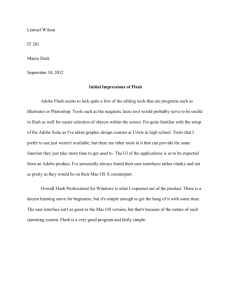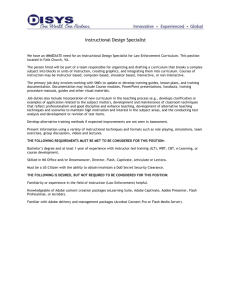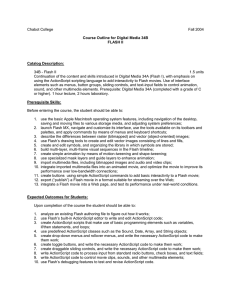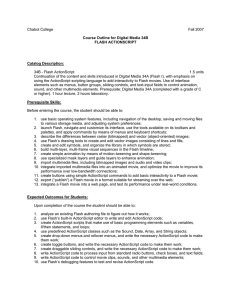resume (Microsoft Word)
advertisement
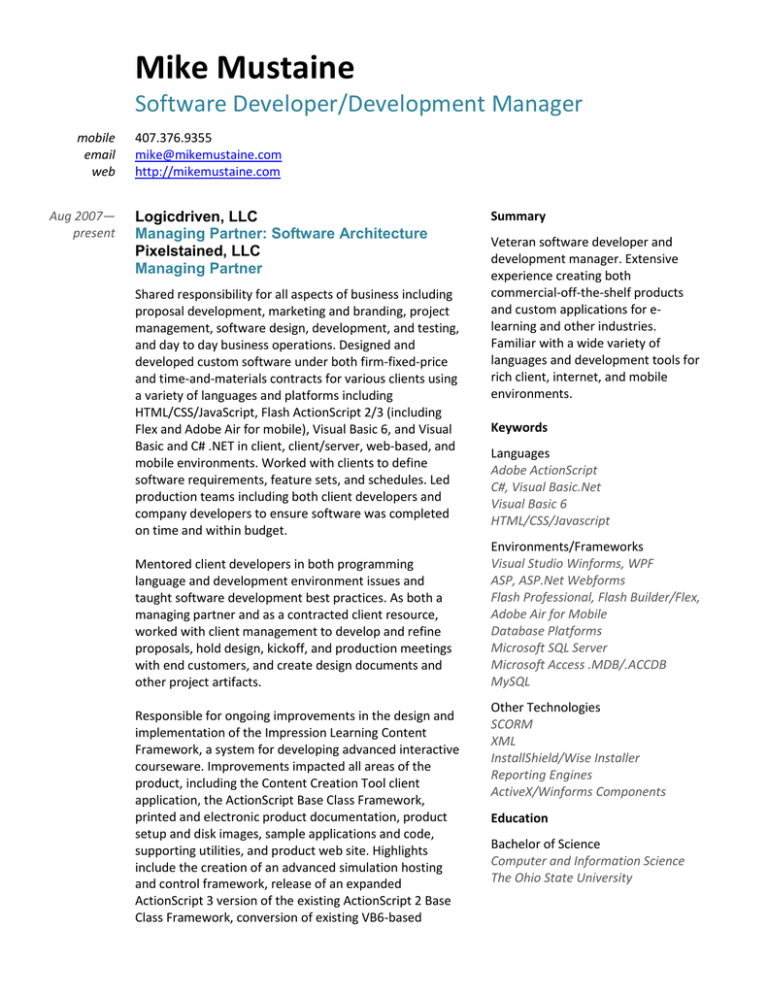
Mike Mustaine Software Developer/Development Manager mobile email web Aug 2007— present 407.376.9355 mike@mikemustaine.com http://mikemustaine.com Logicdriven, LLC Managing Partner: Software Architecture Pixelstained, LLC Managing Partner Shared responsibility for all aspects of business including proposal development, marketing and branding, project management, software design, development, and testing, and day to day business operations. Designed and developed custom software under both firm-fixed-price and time-and-materials contracts for various clients using a variety of languages and platforms including HTML/CSS/JavaScript, Flash ActionScript 2/3 (including Flex and Adobe Air for mobile), Visual Basic 6, and Visual Basic and C# .NET in client, client/server, web-based, and mobile environments. Worked with clients to define software requirements, feature sets, and schedules. Led production teams including both client developers and company developers to ensure software was completed on time and within budget. Mentored client developers in both programming language and development environment issues and taught software development best practices. As both a managing partner and as a contracted client resource, worked with client management to develop and refine proposals, hold design, kickoff, and production meetings with end customers, and create design documents and other project artifacts. Responsible for ongoing improvements in the design and implementation of the Impression Learning Content Framework, a system for developing advanced interactive courseware. Improvements impacted all areas of the product, including the Content Creation Tool client application, the ActionScript Base Class Framework, printed and electronic product documentation, product setup and disk images, sample applications and code, supporting utilities, and product web site. Highlights include the creation of an advanced simulation hosting and control framework, release of an expanded ActionScript 3 version of the existing ActionScript 2 Base Class Framework, conversion of existing VB6-based Summary Veteran software developer and development manager. Extensive experience creating both commercial-off-the-shelf products and custom applications for elearning and other industries. Familiar with a wide variety of languages and development tools for rich client, internet, and mobile environments. Keywords Languages Adobe ActionScript C#, Visual Basic.Net Visual Basic 6 HTML/CSS/Javascript Environments/Frameworks Visual Studio Winforms, WPF ASP, ASP.Net Webforms Flash Professional, Flash Builder/Flex, Adobe Air for Mobile Database Platforms Microsoft SQL Server Microsoft Access .MDB/.ACCDB MySQL Other Technologies SCORM XML InstallShield/Wise Installer Reporting Engines ActiveX/Winforms Components Education Bachelor of Science Computer and Information Science The Ohio State University subsystems to .Net Framework 4, and the development of runtimes for the Apple iOS and Android platforms using Adobe Flash Builder 4.6 (Flex) and Adobe Air 3.Designed and led the development of the Imprint Learning Management Framework, a customizable Learning Management System. Imprint consists of a back-end host that provides low-level access to machine services and a client specific front-end management application that uses the back-end services through a custom application programming interface (API). Imprint was created for environments where a traditional web-based LMS is impractical, including locations with limited or no Internet connectivity, where existing learning materials cannot be easily modified to interface with a web-hosted system, and where support resources are limited. May 2002— Jun 2007 StarMedia/FPMI Solutions Software Development Manager Oversaw development staff responsible for the design, development, and support of e-learning courseware products developed under contract for a variety of customers. Products developed were written in a number of different programming and markup languages, including Visual Basic .NET, Visual Basic 6, Flash (versions 5 through 8), Authorware, Director, Toolbook, and DHTML/CSS with both VBScript and JavaScript. Worked with project managers and programmers to develop and present proposals, product feature sets, and implementation schedules. Briefed personnel on the design and implementation details of coursewareLearning Management System (LMS) communication using both the AICC and SCORM standards. Interviewed and hired personnel as needed, released personnel when necessary. Created the architecture for, and implemented major portions of, the Impression Learning Content Framework system. This system, now released as a commercial product, separates development of courseware content from its implementation and allows instructional designers to use a semi-WYSIWYG storyboarding tool for content creation without regard to the final runtime environment. A series of ActionScript 2.0-based playback classes allows rapid customization and deployment of ELearning software while maximizing reuse of the existing code base. By June 2007, Impression had been successfully used on over a dozen projects requiring both local and web deployment of content and interfacing with AICC and SCORM-compliant LMS systems. Mar 2004— Aug 2007 [various] Software/Management Consultant Provided scheduling, architecture, and infrastructure design support for software designed to provide locationbased advertising, information, and experience services for shopping malls. Software uses a series of Macromedia Flash clients optimized for various mobile device form factors connecting to a Linux-based web server providing XML services data and using Cisco equipment for location data. Created the architecture for, and implemented the administrative backend of, the San Francisco Giants’ Wi-Fi system for 3Com stadium. System used Macromedia Flash clients optimized for both mobile and fixed (luxury suite) platforms to interface with an ASP.Net server. Server provided data to the clients via XML services, and included a series of DHTML/JavaScript pages to manage advertising and services data, SF Giants roster, MLB statistics and game day information, and to control the “7th Inning Stretch” trivia game. Sep 2000— May 2002 StarMedia/FPMI Solutions Senior Programmer Designed, developed, and implemented Simfinity courseware software. Simfinity is a web-based training environment designed to provide pilots with procedural and systems knowledge of large commercial aircraft and is based on the simulation process used to drive full (Level D) flight simulators. The Simfinity Content Creation Tool provides a WYSIWYG environment for storyboarding and allows instructional designers to interface with the aircraft simulation process with a minimal amount of training. The Simfinity Runtime Engine is an ActiveX control that asynchronously downloads lesson data in compressed packages from the Internet and manages all user interaction with the simulation process. Product was written in Visual Basic 6 and uses SQL Server (via ADO) to store content data, which is extracted and packaged for use by the Runtime Engine. Designed, developed, and implemented major portions of multimedia software to support maintenance and operations training for the US Marines’ Medium Tactical Vehicle Replacement (MTVR) program. Developed WYSIWYG storyboard and lesson management tools for use by instructional designers and a viewer to be used for classroom deployment. Written in Visual Basic 6 and using ADO to connect to SQL Server, the tools support 14 different types of storyboards, including stepped animation, hyperlinked graphics, and six different types of student interactions. Sep 1997— May 2002 Logicdriven, Incorporated Vice President CodeMonkey Software, Incorporated President Designed, developed, and supported Li’lTracks child management software. Li’lTracks is a shrink-wrapped application sold to professional and home-based childcare businesses. Written in Visual Basic 6, product uses Jet/DAO 3.51 for data storage, including parameterized SQL queries, ActiveReports for reporting and printing, HTML help, and is deployed using the WISE 7 installation system. Provided telephone and e-mail product support. Product was included on the cover CD of PC Direct (UK), a Ziff-Davis publication. Product was featured in the March 2000 “Basic Heroes” column of the Visual Basic Programmer’s Journal. Designed, developed, and supported product for reporting data retrieved from sensors mounted on largescale strip mining machines. Product was written in Visual Basic 6, uses Jet/DAO 3.51 to access raw dBase III data, and is a Windows based upgrade of an existing dBase product. Originally written to make extensive use of Crystal Reports, product was rewritten to use ActiveReports to overcome Crystal’s limitations. Developed upgrade to American Customer Satisfaction Index (ACSI) Modeling and Analysis Software. Product is a shrink-wrapped program designed to display information from the ACSI survey and to provide limited “what-if” analysis on that data. Product was written in Visual Basic 6 using Jet/DAO, Graphics Server 5.1, custom printing code, and is an upgrade of an existing 16-bit (VB3) product. Redesigned and developed beta release of Cornerstone 2000, a product to manage all aspects of constructionrelated permitting for municipalities. Assisted personnel in the understanding of issues related to Windows/Visual Basic development (product was written in Visual Basic 5 using ADO and was an upgrade to an existing DOS product), provided ancillary training on Visual Basic and the VB development environment, and provided limited NT LAN support. Designed, developed, and supported series of ActiveX controls with over 10,000 downloads. Products support both the Visual Basic 5 and 6 environments, and use either HTML Help or WinHelp 4. Products make extensive use of the COM environment and the Win32 API, including API callbacks, subclassing and thread-level hooking, GDI functions, and window creation and management functions. Products have been mentioned several times in c|net’s ActiveX Dispatch and on their ActiveX.com web site. Product received an “A” rating in the January 2000 issue of FoxPro Advisor magazine. Developed web sites for products using MS FrontPage and Adobe Photoshop. Sites use a combination of HTML and ASP (VBScript/ADO). Web site selected by e-commerce partner DigiBuy as a favorite customized site. Sep 1995— Sep 1997 The Harrington Group, Inc. Manager, Product Development/Product Support Oversaw development staff responsible for the design and development of shrink-wrapped client-server products written in Visual Basic and designed to serve the needs of the Quality Assurance industry, directly and indirectly producing software that provided over 3 million dollars in revenue by year-end 1997. Worked as liaison between developers and company owners to ensure timely release of products and to solidify product feature sets. Created and implemented “HGI InfoSphere”, a biweekly series of lectures intended to introduce developers to new concepts and capabilities available in our development tools. Interviewed and hired personnel as needed, released personnel when necessary. Oversaw support staff responsible for external product support and internal LAN support. Worked with MIS personnel to develop and implement disaster recovery procedures and backup management. Coordinated product testing plans and procedures between support and development staff. Oversaw development and implementation of external web site. Worked with support personnel to develop and improve support call metrics and reports to identify problem areas in existing product lines, reducing problems and support calls. Sep 1994— Sep 1995 The Harrington Group, Inc. Software Developer Designed, developed, and supported client-server and single-user software created for the Quality Assurance industry. Written in Visual Basic versions 3, 4 (16- and 32bit), and 5, this software provided the company with over 1 million dollars in revenue between 1994 and 1997. Products used Crystal Reports, DAO/Jet, and a variety of third-party controls. Wrote printed and online documentation. Developed custom setup program for program deployment that reduced installation-related support calls by over 50%. Provided phone support to customers. Assisted in the management of Windows 3.1 peer LAN. Received Outstanding Employee award. Sep 1989— Sep 1994 The Ohio State University Programmer/Analyst Designed, developed, and supported software written in Progress 5/UNIX to manage food services data, including vendor and product information, warehouse inventory, and interfaces to existing mainframe data assets. Provided onsite support for software. Assisted in the system administration of HP 9000 UNIX servers and a 30-node NeXT workstation network. Received Superior Performance award for work done. Developed and supported software written in PowerBuilder 2 to manage university travel system. Provided onsite support for software and Windows 3.x environment. Developed online documentation using WinHelp 3. Assisted in the administration of a NetWare 3.11 network with three servers and over 100 nodes. Supported Windows 3.0/3.1 connections to a variety of campus resources, including IPX/SPX systems, TCP/IP resources, HP3000 servers, and 3270 connections. Provided PC hardware support, including system installation and parts replacement. Received Superior Performance award. Developed software written in Turbo Pascal to drill vocational education high school students on job-related basic math skills. Used SAS on MVS/Wylbur to generate data analysis reports for review of National Association of Trade and Technical Schools (NATTS) survey data. Provided system support for 75 PC DOS/Windows systems, including hardware support and maintenance. Jun 1990— Dec 1990 International Business Machines Co-op Programmer Tested IMS System Services on MVS/ESA and MVS/XA environments. Worked with development staff to resolve problems encountered in Functional Verification Testing of IMS 3.1. Acted as liaison between test and development staff when solving problems in existing released code, reducing downtime for customers. Received recognition for setting departmental records in number of test cases run over 24- and 48-hour period.
